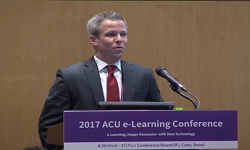2015년 10월부터 시작된 Korea-massive open online course (K-MOOC)는 이용자들의 많은 관심을 받고 있지만, 강좌 안에서 학습자와 콘텐트, 학습자와 학습자 그리고 학습자와 교수자 사이의 상호작용은 ...
http://chineseinput.net/에서 pinyin(병음)방식으로 중국어를 변환할 수 있습니다.
변환된 중국어를 복사하여 사용하시면 됩니다.
- 中文 을 입력하시려면 zhongwen을 입력하시고 space를누르시면됩니다.
- 北京 을 입력하시려면 beijing을 입력하시고 space를 누르시면 됩니다.

K-MOOC 강좌 개발을 위한 상호작용 설계 전략 탐구: Moore의 3가지 유형의 상호작용을 기반으로 = Instructional Strategies to Promote Interaction in K-MOOC: Focused on Moore`s Three Types of Interaction
한글로보기https://www.riss.kr/link?id=A102140790
- 저자
- 발행기관
- 학술지명
- 권호사항
-
발행연도
2016
-
작성언어
Korean
- 주제어
-
등재정보
KCI등재
-
자료형태
학술저널
-
수록면
633-659(27쪽)
-
KCI 피인용횟수
18
- DOI식별코드
- 제공처
- 소장기관
-
0
상세조회 -
0
다운로드
부가정보
국문 초록 (Abstract)
2015년 10월부터 시작된 Korea-massive open online course (K-MOOC)는 이용자들의 많은 관심을 받고 있지만, 강좌 안에서 학습자와 콘텐트, 학습자와 학습자 그리고 학습자와 교수자 사이의 상호작용은 아직 부족한 실정이다. 이에 본 연구에서는 형성연구 방법을 활용하여 K-MOOC에서의 상호작용을 향 상시키기 위한 교수전략을 찾는 것을 연구목적으로 하였다. Moore의 세 가지 유형의 상호작용을 기반 으로, K-MOOC에서 제공하는 21가지 강좌를 관찰하고 비교하기 위해, Coursera, edX, Future Learn, Iversity, Udacity, 그리고 Udemy 이렇게 여섯 가지 MOOCs에서 제공하는 국제적인 강좌와 유사한 콘텐 츠 선정하여, 세 가지 유형의 상호작용을 설계 전략을 설명하기에 좋은 사례를 찾았다. 이를 토대로 K-MOOC 설계자, 개발자 및 교수자를 위해 세 가지 유형별 상호작용을 강화하기 위한 교수전략을 제 안할 수 있었다. 또한 K-MOOC의 발전을 위한 세 가지 제안점으로 (a) 학생들의 K-MOOC 학습에서 학습자와 교수자의 상호작용을 유도 하는 것이 특히 중요하다. (b) 학습 과제는 학습자와 학습자 사이 의 상호작용을 강화하기 위한 설계로서, 학습자와 학습자간 동료 평가를 통한 반성적 상호작용이 포 함되어야 한다. (c) K-MOOC에서 학생 및 콘텐츠 사이의 상호작용을 촉진하기 위해 강좌 정보, 활동, 과제 및 기대효과에 대해 철저한 설명을 제공할 수 있도록 하고, 비디오, 자막, 파워포인트 그리고 프 리젠테이션을 학생이 다운로드하여 활용할 수 있게 설계하는 것을 제안하였다.
다국어 초록 (Multilingual Abstract)
Although Korea-massive open online course (K-MOOC) launched since October 2015 has been well received by the public concerns are still remained about its lack of three types of interaction represented with interaction between student and content, inte...
Although Korea-massive open online course (K-MOOC) launched since October 2015 has been well received by the public concerns are still remained about its lack of three types of interaction represented with interaction between student and content, interaction between student and student, and interaction between student and teacher. The purpose of this research was to seek instructional strategies to enhance three types of interaction in K-MOOC. Formative research methodology was employed for the study. Using Moore``s three types of interaction as a research framework, we observed and compared 21 courses offered in K-MOOC with the same number of international courses offered from six different MOOCs such as Coursera, edX, Future Learn, Iversity, Udacity, and Udemy. Then, we chose best practices that promote three types of interaction. Last, we proposed instructional strategies to enhance three types of interaction for K-MOOC. In addition, we provided three suggestions for further development of K-MOOC. These suggestions include (a) interaction, particularly between student and teacher is critical for students`` learning in K-MOOC, (b) learning tasks designed to enhance interaction between student and student should be implemented in K-MOOC and the interaction between student and student should be reflected in a format of peer evaluation, and (c) interaction between student and content can be promoted in K-MOOC by providing thorough descriptions of course information, activities, tasks, and expectations and by allowing students to download learning materials such as videos, teaching scripts, or powerpoint presentations.
참고문헌 (Reference)
1 이한선, "한국형 온라인공개강좌 개통 한 달 만에 24만 건 이용"
2 김진일, "한국형 무크 플랫폼 표준화를 위한 핵심 기능 도출" 한국정보기술학회 14 (14): 137-145, 2016
3 이성택, "한국의 대학운영제도 변화를 위한 K-MOOC 활용방안에관한 연구" 사단법인 인문사회과학기술융합학회 6 (6): 325-332, 2016
4 이혜정, "웹기반 원격교육의 이론적 논의에 관한 새로운 관점: Moore의 개념을 넘어서" 한국교육학회 42 (42): 137-168, 2004
5 최진숙, "온라인 교육문화혁명: MOOC" 글로벌 문화콘텐츠학회 (14) : 179-198, 2014
6 배예선, "온라인 공개 강좌 MOOC의 현황 분석 및 개선안 연구" 한국정보통신학회 18 (18): 3005-3012, 2014
7 김자미, "영국의 FutureLearn과 프랑스 FUN이K-MOOC에 주는 시사점과 전망" 한국비교교육학회 25 (25): 293-320, 2015
8 정영란, "성찰적 교수 개발 방안으로서의 이러닝 수업컨설팅의 가능성 탐색" 177-181, 2011
9 한형종, "대학 역전학습 온·오프라인 연계 설계전략에 관한 연구" 한국교육공학회 31 (31): 1-38, 2015
10 나일주, "글로벌 학습시대 묵스의 이해" 학지사 2015
1 이한선, "한국형 온라인공개강좌 개통 한 달 만에 24만 건 이용"
2 김진일, "한국형 무크 플랫폼 표준화를 위한 핵심 기능 도출" 한국정보기술학회 14 (14): 137-145, 2016
3 이성택, "한국의 대학운영제도 변화를 위한 K-MOOC 활용방안에관한 연구" 사단법인 인문사회과학기술융합학회 6 (6): 325-332, 2016
4 이혜정, "웹기반 원격교육의 이론적 논의에 관한 새로운 관점: Moore의 개념을 넘어서" 한국교육학회 42 (42): 137-168, 2004
5 최진숙, "온라인 교육문화혁명: MOOC" 글로벌 문화콘텐츠학회 (14) : 179-198, 2014
6 배예선, "온라인 공개 강좌 MOOC의 현황 분석 및 개선안 연구" 한국정보통신학회 18 (18): 3005-3012, 2014
7 김자미, "영국의 FutureLearn과 프랑스 FUN이K-MOOC에 주는 시사점과 전망" 한국비교교육학회 25 (25): 293-320, 2015
8 정영란, "성찰적 교수 개발 방안으로서의 이러닝 수업컨설팅의 가능성 탐색" 177-181, 2011
9 한형종, "대학 역전학습 온·오프라인 연계 설계전략에 관한 연구" 한국교육공학회 31 (31): 1-38, 2015
10 나일주, "글로벌 학습시대 묵스의 이해" 학지사 2015
11 국가평생교육진흥원, "‘K-MOOC 시범 운영 7개월의 성과’ 수강신청 10만, 방문건수100돌파"
12 "https://www.udacity.com/us"
13 "https://www.open2study.com/"
14 "https://www.futurelearn.com/about"
15 "https://www.fun-mooc.fr/about"
16 "https://www.edX.org/"
17 "https://www.coursera.org/about/"
18 "https://iversity.org/en/pages/about"
19 "https://alison.com/"
20 "https://about.udemy.com/"
21 "http://www.veduca.com.br/"
22 "http://www.jmooc.jp/en/about/"
23 Reich, P. B., "The world‐wide ‘fast-slow’plant economics spectrum : a traits manifesto" 102 (102): 275-301, 2014
24 Kop, R., "The challenges to connectivist learning on open online networks : Learning experiences during a massive open online course" 12 (12): 19-38, 2011
25 Pappano, L., "The Year of the MOOC"
26 Cormier, D., "The Open Course : Through the Open Door-Open Courses as Research, Learning, and Engagement" 45 (45): 30-, 2010
27 Breslow, L., "Studying learning in the worldwide classroom: Research into edX's first MOOC" 8 : 2013
28 임걸, "SWOT 분석에 기반한 한국형 MOOCs 설계요소 연구" 한국디지털정책학회 12 (12): 615-624, 2014
29 Fox, R., "Reforming learning and teaching in Asia-Pacific universities" Springer Singapore 159-172, 2016
30 Bogdan, R., "Qualitative research for education" Allyn & Bacon 1997
31 Hew, K. F., "Promoting engagement in online courses: What strategies can we learn from three highly rated MOOCs" 47 (47): 320-341, 2016
32 Greene, J. A., "Predictors of retention and achievement in a massive open online course" 2015
33 De Waard, I., "Merging MOOC and mLearning for increased learner interactions" 4 (4): 34-46, 2012
34 조문흠, "Massive Open Online Courses (MOOCs)을 활용한 대학 정규수업에서 학습자의 동기유형별 학습 패턴 분석" 한국교육학회 53 (53): 193-223, 2015
35 Guo, P. J., "March). How video production affects student engagement : An empirical study of mooc videos" 41-50, 2014
36 이수지, "MOOC의 전망과 과제" 19 : 107-139, 2013
37 Liyanagunawardena, T. R., "MOOCs: A systematic study of the published literature 2008-2012" 14 (14): 202-227, 2013
38 Wilson, L., "MOOCs-international information and education phenomenon?" 40 (40): 35-40, 2014
39 이병현, "MOOC 학습자들의 특성에 관한 국외 문헌 고찰" 한국교육공학회 31 (31): 365-399, 2015
40 Najafi, H., "MOOC integration into secondary school courses" 15 (15): 306-322, 2014
41 Moessinger, S., "MOOC around the world, part 6—“MOOCish” online ed resources"
42 Bartoletti, R., "Learning through Design: MOOC Development as a Method for Exploring Teaching Methods" 3 (3): 2-, 2016
43 장상현, "K-MOOC 플랫폼의 발전에 대한 비교 연구" 4 (4): 33-38, 2016
44 Khalil, H., "June). How satisfied are you with your MOOC?-A Research Study on Interaction in Huge Online Courses" 830-839, 2013
45 Miyazoe, T., "Interaction equivalency in an OER, MOOCS and informal learning era" 2013 (2013): 2013
46 Sandeen, C., "Integrating MOOCs into traditional higher education : The emerging MOOC 3. 0 era. Change" 45 (45): 34-39, 2013
47 Reigeluth, C. M., "Instructional-design theories" 1999
48 Thiagarajan, S., "Instructional development for training teachers of exceptional children: A sourcebook" Leadership Training Institute/Special Education, University of Minnesota 1974
49 Jordan, K., "Initial trends in enrolment and completion of massive open online courses" 15 (15): 133-160, 2015
50 Murphy, J., "Information and Communication Technologies in Tourism 2016" Springer International Publishing 653-665, 2016
51 Rai, L., "Influencing factors of success and failure in MOOC and general analysis of learner behavior" 6 (6): 262-, 2016
52 Bloom, B., "Hand book on formative and summative evaluation of student learning" McGraw-Hill 1971
53 Hone, K. S., "Exploring the factors affecting MOOC retention: A survey study" 98 : 157-168, 2016
54 Saadatdoost, R., "Exploring MOOC from education and information systems perspectives : a short literature review" 67 (67): 505-518, 2015
55 Liu, M., "Examining the Use of Facebook and Twitter as an Additional Social Space in a MOOC" 30 (30): 14-26, 2016
56 Koutropoulos, A., "Emotive vocabulary in MOOCs: Context & participant retention" 15 (15): 2012
57 Moore, M. G., "Editorial: Three types of interaction" 3 (3): 1-7, 1989
58 Veletsianos, G., "Digging deeper into learners’ experiences in MOOCs : Participation in social networks outside of MOOCs, note taking and contexts surrounding content consumption" 46 (46): 570-587, 2015
59 Kizilcec, R. F., "Deconstructing disengagement: analyzing learner subpopulations in massive open online courses" 170-179, 2013
60 Wang, Y., "Content or Platform : Why do students complete MOOCs?" 11 (11): 17-30, 2015
61 Carr, J., "Applications of centre manifold theory (Vol. 35)" Springer Science & Business Media 2012
62 Belleflamme, P., "An economic appraisal of MOOC Platforms : business models and impacts on higher education" 62 (62): 148-169, 2016
동일학술지(권/호) 다른 논문
-
언어네트워크 분석 활용 스마트교육에 대한 연구 동향 분석
- 한국교육정보미디어학회(구 한국교육정보방송학회)
- 서준일 ( Joonil Seo )
- 2016
- KCI등재
-
플립러닝에서 자기결정성 요인, 협력지향성, 인지적 실재감, 인지된 성취도의 관계
- 한국교육정보미디어학회(구 한국교육정보방송학회)
- 임규연 ( Kyu Yon Lim )
- 2016
- KCI등재
-
초등학교 플립드 러닝의 효과 분석: 학업성취도와 교과 태도를 중심으로
- 한국교육정보미디어학회(구 한국교육정보방송학회)
- 정민 ( Jeong Min )
- 2016
- KCI등재
-
- 한국교육정보미디어학회(구 한국교육정보방송학회)
- 양미석 ( Miseok Yang )
- 2016
- KCI등재
분석정보
인용정보 인용지수 설명보기
학술지 이력
| 연월일 | 이력구분 | 이력상세 | 등재구분 |
|---|---|---|---|
| 2026 | 평가예정 | 재인증평가 신청대상 (재인증) | |
| 2020-04-20 | 학회명변경 | 영문명 : Korea Association Of Educational Information & Broadcasting -> Korea Association for Educational Information and Media |  |
| 2020-01-01 | 평가 | 등재학술지 유지 (재인증) |  |
| 2017-01-01 | 평가 | 등재학술지 유지 (계속평가) |  |
| 2013-01-01 | 평가 | 등재학술지 유지 (등재유지) |  |
| 2010-01-01 | 평가 | 등재학술지 유지 (등재유지) |  |
| 2008-01-01 | 평가 | 등재학술지 유지 (등재유지) |  |
| 2005-01-01 | 평가 | 등재학술지 선정 (등재후보2차) |  |
| 2004-01-01 | 평가 | 등재후보 1차 PASS (등재후보1차) |  |
| 2003-01-01 | 평가 | 등재후보 1차 FAIL (등재후보1차) |  |
| 2001-07-01 | 평가 | 등재후보학술지 선정 (신규평가) |  |
학술지 인용정보
| 기준연도 | WOS-KCI 통합IF(2년) | KCIF(2년) | KCIF(3년) |
|---|---|---|---|
| 2016 | 1.59 | 1.59 | 1.95 |
| KCIF(4년) | KCIF(5년) | 중심성지수(3년) | 즉시성지수 |
| 2 | 1.96 | 2.299 | 0.35 |
연관 공개강의(KOCW)
-

AI시대의 고등교육, 어떻게 해야 할까
신한대학교 신종우 -

종합토론 : 고등교육 혁신지원을 위한 대학원격교육지원센터(UDEC) 발전 방안
한국교육학술정보원 이태억, 김정숙, 김현철, 박주병, 서순식, 장상현 -

2017 ACU 이러닝 국제 콘퍼런스
한국교육학술정보원 션 코너(Sean Connor), 아베리노 메지아(Avelino A. Mejia Jr.), 멜린다 델라페나 반달라리아(Melinda dela Pena Bandalaria), 가또 하리 쁘리오잔또 -

글로벌 인재포럼 2007: 고등교육의 질 관리
글로벌 인재포럼 Barbara Ischinger,, Peck Cho, Director, Roger Benjamin -

2011 Asian and Africa Womens conference
숙명여자대학교 한영실





 KCI
KCI KISS
KISS


